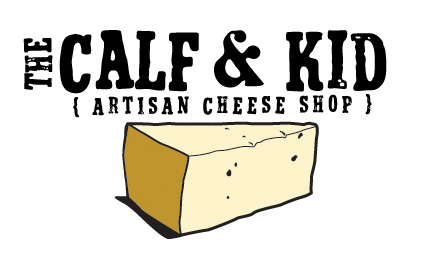Last week U.S. Fire Marshalls issued a seizure of all cheeses made by local cheesemakers Estrella Family Creamery in Montesano, WA. This final act of shutting down the creamery is the culmination of many months of back-and-forth between the Estrella's and the FDA concerning positive strains of Listeria in some of their raw milk cheeses.
I've been thinking a lot about this issue and exactly how I want to approach it and what I feel is purposeful for me to say as a retailer. Rather than repeat what has already been covered by many other sites, I will refer you to a summary of events by Tami Parr of Pacific Northwest Cheese Project, which also links to the official Report by the FDA and an article in the Seattle Times.
This event has the potential to put the Estrella's out of the cheesemaking business for good, and personally I think that would be a tragedy. They have been making amazing farmstead cheese for many years, and they have built a reputation among the greater Seattle area and beyond for producing stellar products. They are good people who have no intention of harming the supportful community that buys their cheese. I love their cheese, and I really hope that I will have the opportunity to sell it again the near future.
That being said, I keep thinking about Listeria, it seems to be all anyone can blather about in the case of the Estrella's. While I think there is a bigger issue to be addressed, I do want to clarify just a few details about it. Listeria monocytogenes, the bacteria known to cause infections of Listeria, is a pathogen that naturally occurs in the environment, most commonly in soil, stream water, and plants. Because it is found in these things, it is often passed through people and animals into sewage and food -- not to be confused with the Seattle Times single claim that it is found in fecal matter, insinuating that only unsanitary and careless cheesemakers would transfer it from animal to product. While Listeria monocytogenes can be harmful to the young, elderly, immunocompromised, and pregnant women, most healthy adults can ingest the bacteria in food etc. and never experience any symptoms of a Listeria infection.
What I find most compelling and exasperating is not the issue of Listeria pahtogens being found in the Estrella's cheese, or any cheese for that matter, but the way that this potential hazard is dealt with by our current federal regulations. I view eating most cheeses, raw milk or not, along the same level of risk that may be associated with eating cured meat, undercooked beef, raw egg in a salad dressing, etc. It is a calculated risk that I personally take because I love the food. I may get sick or not, but what is important to me is that the people serving me these "risky" products educate and inform me of any potential illness that may result from eating them. I realize that an evening spent in the bathroom does not compare to potential birth defects and other long term issues that can arise from Listeria infection, however I still stand by my belief that we should be allowed to make the choice ourselves.
I typically have between 15 and 20 raw milk cheeses available at any given time, and many customers who want to buy exclusively raw milk cheese. I also have plenty of customers who want to stay the hell away from raw milk cheese, and then those who aren't sure about it so I tell them the facts and lay out the most conservative route they may take in cheese buying, but ultimately, it's up to them, and that's the way it should be.
Tuesday, October 26, 2010
Subscribe to:
Post Comments (Atom)





I also feel terrible for the Estrella family, but I disagree with your conclusions and I'm sure you realize that your knowledge of raw milk and their products greatly exceed the casual consumer. Most people that I know ( I know that sounds anecdotal) would never knowingly ingest anything that could possibly make them sick, even an evening in the bathroom. Realistic? No. But I believe it to be true. My thoughts are based on 40 years of the restaurant business, doesn't make them true, just my thoughts.
ReplyDeleteThanks for your thoughts Anon. Of course I know that my knowledge of raw milk products exceeds that of the average consumer, which is precisely why I'm the one behind the counter and writing about it here. My ultimate goal is to bring consumers closer to the food they eat, which includes educating them about the potential risks that may come along with eating something.
ReplyDeleteMy greatest concerns are to what happens to a cheese after it is bought... someone serves it at a party or to family and friends without knowledge of their health issues. I don't think raw cheese should be banned, but I do think that monitoring is good! Seven people died last year in Germany from one cheesemaker-- Listeria.
ReplyDelete